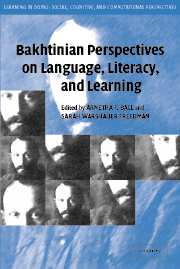Book contents
- Frontmatter
- Contents
- List of Contributors
- Acknowledgments
- PART I IDEOLOGIES IN DIALOGUE: THEORETICAL CONSIDERATIONS
- PART II VOICED, DOUBLE VOICED, AND MULTIVOICED DISCOURSES IN OUR SCHOOLS
- PART III HETEROGLOSSIA IN A CHANGING WORLD
- PART IV A CLOSING THOUGHT ON BAKHTINIAN PERSPECTIVES
- 13 The Process of Ideological Becoming
- Author Index
- Subject Index
- Titles in the series
13 - The Process of Ideological Becoming
Published online by Cambridge University Press: 24 May 2010
- Frontmatter
- Contents
- List of Contributors
- Acknowledgments
- PART I IDEOLOGIES IN DIALOGUE: THEORETICAL CONSIDERATIONS
- PART II VOICED, DOUBLE VOICED, AND MULTIVOICED DISCOURSES IN OUR SCHOOLS
- PART III HETEROGLOSSIA IN A CHANGING WORLD
- PART IV A CLOSING THOUGHT ON BAKHTINIAN PERSPECTIVES
- 13 The Process of Ideological Becoming
- Author Index
- Subject Index
- Titles in the series
Summary
Sarah Freedman and Arnetha Ball describe learning as a dialogic process. It is not merely a transmission of knowledge, but an activity in which whole selves are formed and acquire new capacities for development. We live in a world of enormous cultural diversity, and the various languages and points of view – ideologies in Bakhtin's sense – of students have become a fact that cannot be ignored. Teachers need to enter into a dialogue with those points of view and to help students do the same. For difference may best be understood not as an obstacle but as an opportunity.
The range of “authoritative” and “innerly persuasive discourses” in our classrooms appears to be growing along with our cultural diversity. Freedman and Ball observe: “This rich and complex ‘contact zone’ inside the classroom yields plentiful opportunity for students to decide what will be internally persuasive for them, and consequently for them to develop their ideologies. This diversity presents both challenges and opportunities as teachers seek to guide their students on this developmental journey” (pp. 8–9, this volume). The journey they have in mind does not so much lead to a particular goal as establish an ever-enriching process of learning.
Freedman and Ball's approach grows out of Bakhtin's key concepts, especially one that has been largely neglected in research on him: “ideological becoming” (see Chapter 11, this volume). The implications of the essays in this volume therefore extend well beyond educational theory and practice to the humanities and social sciences generally.
- Type
- Chapter
- Information
- Bakhtinian Perspectives on Language, Literacy, and Learning , pp. 317 - 332Publisher: Cambridge University PressPrint publication year: 2004
- 62
- Cited by

